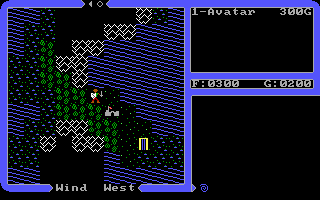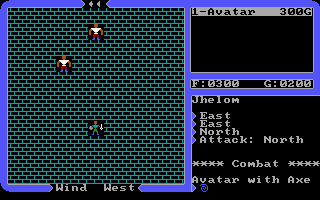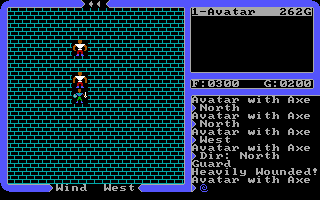Part 2: The Game Itself
The Game Itself
For a quick overview of what's up in Ultima IV, let's quickly and briefly go over the game screens.


The game takes place almost exclusively (except in dungeons, but I'll get to that when I actually reach one) in a screen like this one. The Avatar-to-be is the dude in the center of the screen; his sprite is unique, no matter what class he is. Over on the right is the party list, with character names, Hit Points, and Condition. The "300g" does not refer to money, but rather to HP and status; so this means "300 Hit Points, Condition Good." If you're poisoned or cursed or whatever, the "G" will change to something else to reflect this.
Down below that is Food (like most Ultima games, you need to eat periodically, but it's not hard to keep up on) and Gold (currency, moolah, the stuff we'll use to buy stuff that makes murdering other stuff easier). Even further below that is the text input window, which tells us what we've been doing. Conversation also happens in here. There isn't a whole lot of space, so it can be kind of cumbersome.
Everything else is controlled by the keyboard. The arrow keys move the Avatar and gang around on the map, which is full of various kinds of terrain with various effects (thick vegetation slows your movement, forests block line of sight, swamps are poisonous). You use various keyboard commands to do things. Most are intuitive, like Attack, Talk, or Enter, but due to some degree of overlap there are a few oddities like Ztatus, Klimb Ladder, and Jimmy Lock. Conversation is handled by a text parser which triggers off keywords and occasionally asks yes/no questions. The keywords to ask are usually pretty obvious, but it helps to remember the Basic Ultima Keywords, which are "Name," "Job," and "Health." This asks the NPC who they are (if they don't tell you), what they do, and how they're feeling.
Oh, and the little blue and yellow square southeast of town is a Moongate. Note the gray circles at the top of the screen; those are the moons of Trammel and Felucca. Trammel controls what moongate is open, and Felucca controls where it goes. You can use this to teleport around before you have access to a ship, but you'll need a boat to complete the game anyway so it pays to get one ASAP.


Combat is likewise top-down and grid-based, with everybody taking a turn in sequence. I forget whether initiative is controlled by Dexterity or not, but I seem to recall it being like that. Everybody gets one turn a round no matter how fast they are, so this obviously advantages having lots of party members. They're not strictly necessary though.
You're never actually shown how hard you hit somebody. HP is a mystery, but you do get a general idea of how hurt somebody is. The game will also tell you when someone is fleeing. Since people get only one move a turn, an enemy that gets away from you is going to flee if you don't have some kind of ranged weapon. In some cases you want the enemy to flee (you don't want to kill innocent bears and snakes after all), but you don't get experience for failing to kill something (you do get a chest with money no matter what if you actually win the fight though), so leveling up is going to take some actual killing.
There are basically three stats in Ultima: Strength, Dexterity, and Intelligence. Dexterity is hitting things, Strength is hitting things hard, Intelligence is casting spells. Some classes don't really benefit from Intelligence (Fighters and Shepherds, though even classes that can cast spells don't necessarily want to). There are a few derived stats as well, like Magic Points. Magic is handled a little differently in Ultima, although you're already familiar with how it works if you've played any other game in the series.
Basically, you need three things to cast magic: Some magic points (which just prevent you from casting spells all day long), a few reagents (magical herbs and such that are expended when the spell is cast), and an incantation. You can find the incantations if you talk to enough people, but true Ultima diehards probably already know what all the spells are. Funny enough, the individual words in the incantations actually have meanings, and if you know those meanings you can figure out what the spell does (or guess the existence of a spell by combining some words together). Magic points are controlled by class (which adds a multiplier) and Intelligence. Some classes have a multiplier of 0, most have a multiplier of 1/2, and one or two have a multiplier of 1. In Ultima V the Avatar will basically get the benefits of being every class at once, but he's restricted to one class for now. That's why I was hoping you'd pick one that at least gets spell points. But I think you've done well so far.
The Virtues - An Overview
Alright, so we need to master the Virtues to become the Avatar and win the game (we have to do some other stuff too, but that will become clear as things progress). So what are the Virtues, and how do we raise them?
Virtues are basically a hidden score, which you can find out by talking to Hawkwind the Seer in Britain. He'll give you a basic rundown on what your score is, roughly. Once a virtue is maxed out, you have to go to the Shrine of that Virtue and meditate there using the mantra. Which means you have to know what the mantra is and have the Shrine properly prepared to meditate at. Nobody said this was going to be simple.

Compassion is caring about other people, feeling their pain, and helping them through it. The Avatar must be able to empathize with people and (of course) help them out.
Principle: Love.
City: Britain, also the capital of Britannia and the home of Lord British (noticing a theme?).
Class: Bard, which means Iolo (even though Iolo is associated with Yew a lot, but that's from the next game on).
Dungeon: Despise. The Avatar can't hate people or things just because.
Color: Yellow.
Goes Up When: You're nice to people. Giving to the poor and sick raises Compassion, as does refusing to kill non-evil enemies by either running away or letting them escape.
Goes Down When: You attack people or creatures who aren't evil. It's okay if you're attacked, but you don't want to kill them.

Honesty is telling the truth, being even in your dealings, and seeking truth in others. The Avatar must be truthful, or else why would anybody trust him?
Principle: Truth.
City: Moonglow, the city of mages.
Class: Mage, which means Mariah (who is playable in this game and the next one but not always in the other games).
Dungeon: Deceit. The Avatar must always avoid misleading people on purpose, even for good ends.
Color: Blue.
Goes Up When: You're honest. If somebody asks a question, answer with the truth. Don't say you know things that you don't, and always pay what you owe.
Goes Down When: You cheat people, or steal chests that belong to (non-evil) people.

Honor means following your word and living up to the standards of the Virtues. If the quest is to become the Avatar (and it is), he must be dedicated to that quest wholeheartedly and never surrender it for petty reasons.
Principle: Truth & Courage.
City: Trinsic, the city of paladins.
Class: Paladin, which means Dupre.
Dungeon: Shame. The Avatar must never take actions that would shame him or the people who trust him, or for that matter, Britannia and the Virtues themselves.
Color: Purple.
Goes Up When: You pursue the Quest of the Avatar. Collecting objects and solving quests necessary to reach Avatar status raises your Honor. You also get a little Honor for other charitable actions like giving to the poor and being honest and just.
Goes Down When: You do things for personal gain, like steal or cheat, and when you attack things that are not evil.

Humility means never losing sight of the fact that you are ultimately just like everyone else. The Avatar is a special person, but the potential for Avatarhood exists in everyone. Just because one is the most virtuous doesn't mean one can be cocky about it. Anyone could have gotten to the same place.
Principle: None, but none of the Principles are true without a healthy dose of Humility.
City: New Magincia, built from the ruins of Magincia, the city of Pride.
Class: Shepherd, which means Katrina (who is always pretty much the worst NPC in Ultima, but that is the point).
Dungeon: None... well, none in this game. You'll see in the next one. The Abyss is close to the Shrine of Humility though.
Color: Black.
Goes Up When: You resist the temptation to toot your own horn. Tell people you're not a hero when they say you are. Accept praise without boasting. Don't tell people you're the best even if it's true.
Goes Down When: You brag about how awesome you are. Even when it's the truth.

Justice means getting what you deserve and giving unto others what they deserve, both good and bad. The Avatar must obey the law in letter and spirit, but above all must make sure that the world is equitable for the righteous and the wicked alike. That means kicking evil's ass, but also upholding good.
Principle: Truth & Love.
City: Yew, hidden city of the druids.
Class: Druid, which means Jaana. She's one of the less important Ultima NPCs.
Dungeon: Wrong. Not in the sense of "that's wrong," but in the sense of "you have wronged me." The Avatar must never do something that would benefit or harm someone in a manner they didn't have coming.
Color: Green.
Goes Up When: You're honest and truthful to people who deserve it and merciful to things that aren't evil, like people and wild animals.
Goes Down When: You steal from people, harm innocents, or cheat shopkeepers.

Sacrifice means giving of yourself without any expectation of reward, and indeed, with the knowledge that the loss for doing so is potentially great. The Avatar has to be willing to give of himself for the people of Britannia, both in terms of his time and effort and in real, physical terms, by fighting evil.
Principle: Courage & Love.
City: Minoc, city of miners and tinkers.
Class: Tinker, which means Katrina (who is an excellent NPC in the next game, incidentally).
Dungeon: Covetous. The Avatar must be willing to give things up without wanting something from somebody else at the same time. It's not sacrifice if you know you can get something out of it.
Color: Orange.
Goes Up When: You do things that hurt. Getting beaten up and even killed can raise your Sacrifice, but there are other ways to give of yourself without losing tons of battles. If somebody asks for something, give it to them. Don't worry about what you'll get back.
Goes Down When: You run away or refuse to give of yourself to help people.

Spirituality means following your heart and soul in all things. The Avatar must be pure of spirit and guided on his path by the desire to better himself and others.
Principle: Truth, Love, & Courage. Spirituality is a necessary element to all three.
City: Skara Brae, the quiet city.
Class: Ranger, which means Shamino.
Dungeon: Hythloth. I'm not sure what that means, but it's something along the lines of impurity of spirit or hubris. The Avatar can't have that, obviously.
Color: White.
Goes Up When: You do things that are spiritual in nature. Pursue the quest by searching your own soul, meditation at the Shrines of the Virtues, and consultation with Hawkwind the Seer to find out how far along you are on the Quest of the Avatar.
Goes Down When: You're a sloppy, random, guessing cheater. Pray at the wrong shrine, say the wrong mantra, or not have necessary items for rituals and you've shown you're not really all that good at the whole Avatar thing.

Valor means never giving up. The Avatar must never cease improving himself and can never abandon Britannia (except all those times he does between games, but whatever). In battle, never be beaten, and never allow the wicked to escape.
Principle: Courage.
City: Jhelom, city of fighters.
Class: Fighter, which means Geoffrey (an underrated badass in Ultima VI).
Dungeon: Destard. The Avatar can't be a yellow-bellied sissy.
Color: Red.
Goes Up When: You kick evil's ass. If it threatens Britannia, blow it away with all due haste.
Goes Down When: You run away. Note that this conflicts with Justice, Compassion, and Honor's demands that you run from the non-evil things in the world. Valor doesn't care. Valor is just that badass. If you run from anything, you better smite twice as hard next time to make up for it.
The virtues are further encompassed into the Three Principles:
Love is the source of Compassion, Justice, and Sacrifice. Love is what makes a person care for others and desire to see the world operate as it should. Love is also what inspires a person to the Courage risk everything to make sure the world can be full of Truth, if necessary. Love is opposed by Hatred, the desire to make the world as one thinks would benefit the self, rather than the world at large.
Symbol: The Candle of Love.
Castle: Empathy Abbey, near Yew.
Truth is the source of Honesty, Justice, and Honor. Truth is what makes a person act justly and seek justice for and with others. Truth is what makes a person stick to his Courage and follow his duty and his Love. Truth is opposed by Falsehood, the deliberate and constant distortion of the world for one's own ends.
Symbol: The Book of Truth.
Castle: The Lyceum, near Moonglow.
Courage is the source of Valor, Sacrifice, and Honor. Courage is what makes a person stand up for what is right, even at great risk to oneself. Courage is the strength to put Love and Truth into action. Courage is opposed by Cowardice, the all-consuming desire to benefit the self without suffering or risk.
Symbol: The Bell of Courage.
Castle: Serpent Hold, near Jhelom and Trinsic.
There are no dungeons specifically tied to the anti-Principles, but don't worry, there will be something in the next game to cover that.
There is one more secret thing, but we'll get to that when we finalize our Avatar status and win the game.
You can keep deciding on the whole class thing for now, but Druid (Justice) seems like a pretty good choice. It can't use all the best weapons and armor, but it can use some of the more fun ones. Tinker wouldn't necessarily be bad either. No class is bad in the endgame, but actually reaching it would be a pain in the ass as a Shepherd and there's no real payoff besides the satisfaction of tormenting me. And I'd rather not be tormented, because I actually enjoy this game.